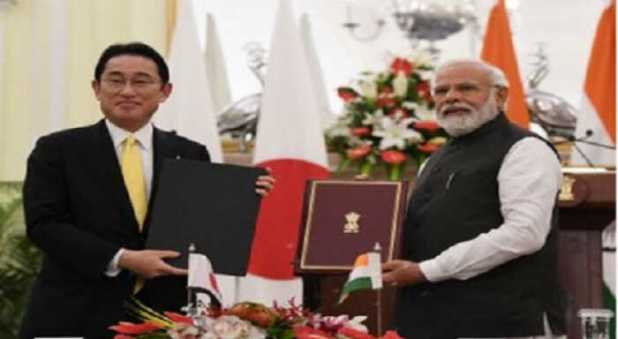
New Delhi, March 19 : India and Japan on Saturday inked six agreements, including one for Japanese loan worth Rs 20,400 crore for key connectivity and water supply projects, and also announced a 5 trillion yen investment target for the next five years, and launch of a Clean Energy Partnership. The announcements were made during the 14th India-Japan summit talks between Prime Minister Narendra Modi and Japanese PM Fumio Kishida here today. The agreeement included a Memorandum of Cooperation (MoC) in the field of Cybersecurity – for information sharing, capacity building programs and cooperation in the area of cybersecurity. The two sides inked seven JICA ( Japan International Cooperation Agency) Loans worth Rs 20,400 crores for projects in connectivity, water supply and sewerage, horticulture, healthcare, and biodiversity conservation in various States. These included a) Dedicated Freight Corridor Project (Phase 2) b) North East Road Network Connectivity Improvement Project (NH208 (Khowai – Sabroom)) Phase 6 c) Bengaluru Water Supply and Sewerage Project (Phase 3) (II) d) Uttarakhand Integrated Horticulture Development Project e) Strengthening Health Systems and Excellence of Medical Education in Assam f) Tamil Nadu Biodiversity Conservation and Greening Project Phase –II g) and for the Chennai Metro (Phase 2) (II) The two sides also signed the document for Amendment of Article 7 (Exchange of Information) of Implementing Agreement (IA) signed between the two countries as per Article 13 of India-Japan Comprehensive Economic Partnership Agreement (CEPA); And to Amend Annex 2 (Product Specific rules) of CEPA to allow the fish surimi product of India with the non-originating additive to be considered as an originating good of India. They also inked a Memorandum of Cooperation (MoC) on Decentralized Domestic Wastewater Management – To introduce Johkasou technology in India by Japanese companies for decentralized waste water treatment. It is used in areas where sewage infrastructure has not yet been developed. They also inked the India-Japan Industrial Competitiveness Partnership Roadmap. This is to implement the Memorandum of Cooperation (MoC) on India-Japan Industrial Competitiveness Partnership that was signed in November 2021. It seeks to seeks to address issues that Japanese companies currently face in India through a fast-track mechanism. Working Groups on logistics and textiles have been established and in other sectors as needed. It includes cooperation in Micro, Small and Medium Enterprises (MSME) sector and supply chain matters. The sixth agreement was a Memorandum of Cooperation on Sustainable Urban Development. It Builds on the 2007 Memorandum of Understanding (MoU) on Urban Development to include smart cities development, affordable housing, urban flood management, wastewater management, Intelligent Transport Management System etc. The two sides also announced the launching of a Clean Energy Partnership (CEP). This is for cooperation in areas such as electric vehicles, storage systems including batteries, electric vehicle charging infrastructure, development of solar energy; hydrogen; ammonia; etc. The objective is to encourage manufacturing in India, creation of resilient and trustworthy supply chains in these areas as well as fostering collaboration in R&D. It will be implemented through the existing mechanism of Energy Dialogue. They also announced a 5 trillion yen investment target (TBC). This follows from the Investment Promotion Partnership of 2014 when both sides had agreed for JPY 3.5 trillion investment during 2014-19. That target has been met, taking into account both ODA and Investments from Japan. The new ambitious target would provide a scope for greater involvement of Japanese companies in our economy. The two sides announced a Sustainable Development Initiative for the North Eastern Region of India. This Includes both ongoing projects and possible future cooperation in various States in the NER in areas such as connectivity, healthcare, new and renewable energy, as well as ‘Initiative for Strengthening Bamboo Value Chain in the North East’. RN

